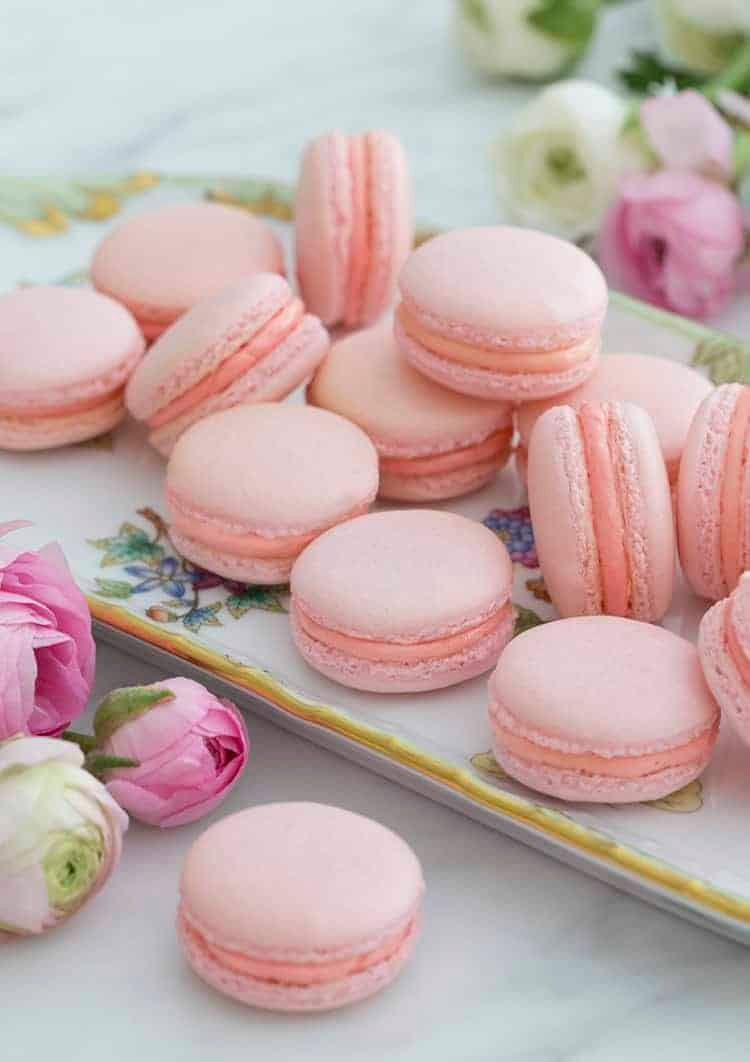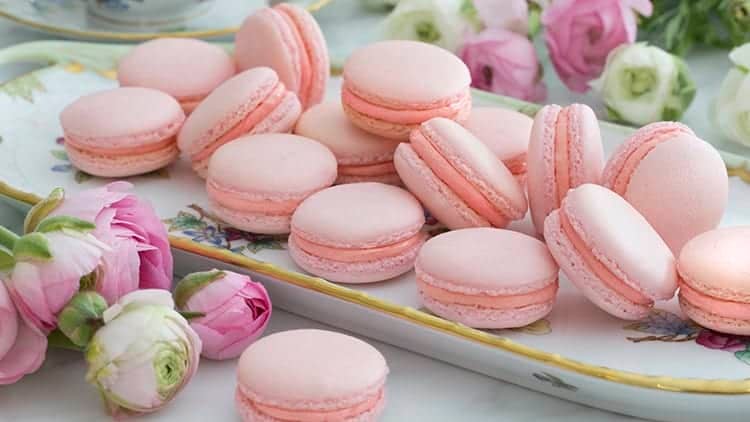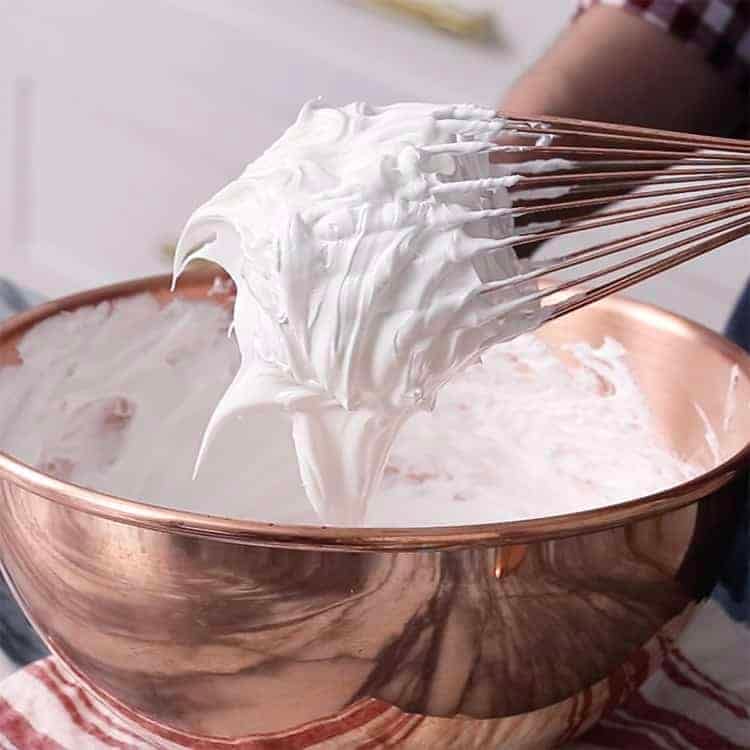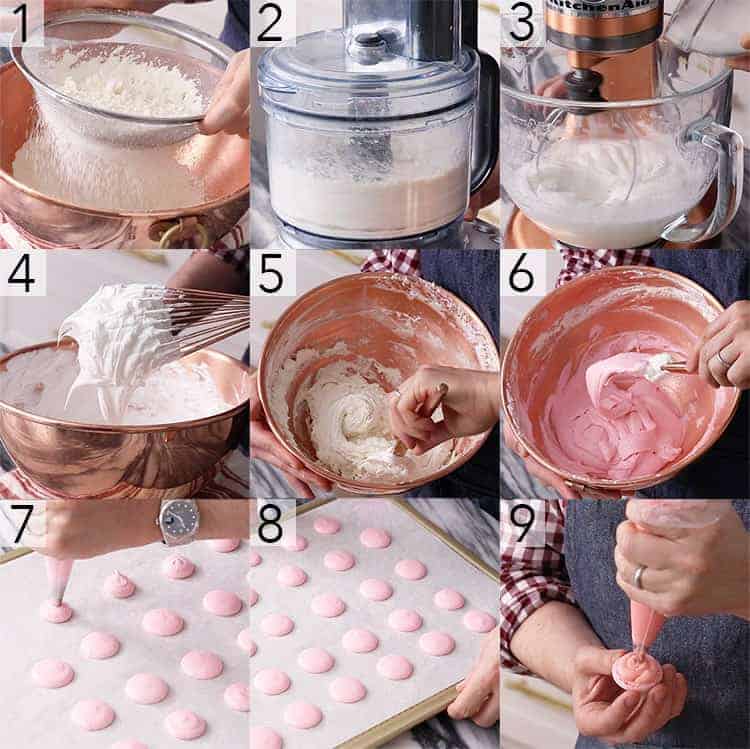Macaron Recipe
This easy French macaron recipe makes a batch of the most dainty, delicate, and delicious cookies that will float right into your mouth and disappear. I’ve packed all my tips into this post to help you out!

These French macarons make a very special treat to give your friends and family. They also look pretty on a plate for guests to indulge in when they come over. They can definitely be finicky but once you learn how to make macarons you’ll be hooked!
Even if your cookies come out of the oven looking totally wrong they’ll still be delicious if not picture perfect.
TOP TIPS FOR MAKING THIS MACARON RECIPE
- THE MERINGUE!!!! That meringue HAS TO BE STIFF! I had no idea French meringue could be whipped to such a thick marshmallowy consistency but all it takes is a bit of extra whisking. You’ll notice the meringue start to fill the whisk when you’re getting close to the right stage.
- Age your egg whites! Separate the eggs, place the whites in a clean glass, cover with plastic wrap and let them hang out in the fridge for a few days before using. This will dehydrate them and make them perfect for macarons.
- Sift, Sift, SIFT! Those larger pieces of almond flour will mar the surface of your macarons. Best practice is to sift then whiz in the food processor and repeat two more times. Discard the larger particles, don’t try to press them through the sieve.
- The mixing will take some practice, you will fold and fold the batter and then use the spatula to GENTLY press the batter against the bowl. You want to remove some of the bubbles but not to many… Continue this until it reaches a thick “lava” consistency. It should slowly fall off the spatula in ribbons and be able to form a figure eight without breaking.
- Pipe the macarons perpendicular to the surface. If your tip is pointing a bit in any particular direction when you pipe the macarons might be oblong or malformed.
- Add your coloring to the meringue after it reaches the soft peak stage.
- When you are finishing the piping motion stop squeezing the bag and pull up with a circular motion.
- The macarons will be best after 2-3 days resting in the fridge.
- If you over-bake the shells and they’re too crisp, brush the bottom with some milk before assembly to soften them up.

MACARONAGE
When you fold that STIFF meringue with the almond sugar mixture it will start off looking really rough but as you continue folding if will become silkier and begin to flow off the spatula in a slow,thick and steady drizzle.
You’ll want to deflate SOME of the bubbles in the mixture so you can gently swipe the spatula over the surface of the batter to help remove some of them.
Some recipes give you a specific number of folds but I’ve found that you really need to fold and smooth the batter until it tells you to stop. If it’s humid outside or the temperature is warm or cold that day your macaronage will be affected.
As your batter reaches the desired stage you’ll see it become shiny and slowly fall off the spatula in a ribbon that can form a figure “8” without breaking. When you press the batter big air bubbles will not be present.
FRENCH MACARON FILLING
I whipped up a batch of creamy, custardy French buttercream using my left over yolks to fill my macarons but you can use ANY filling you like!! Try an American buttercream, Italian meringue buttercream, a whipped ganache or a disk of ice cream!

ARE MACARONS FROM FRANCE?
While macarons are heavily associated with France, they are actually thought to have been brought over from Italy to France by the chef of Catherine de Medici, queen of France in the 16th century.
WHAT IS A FRENCH MACARON?
A macaron is a delicate meringue-based cookie sandwich made primarily from egg whites, almond four, and sugar. The outside is crisp but inside they’re more moist and chewy. They can be filled with a ganache, buttercream or anything desired!
WHAT IS THE DIFFERENCE BETWEEN A MACAROON AND A MACARON?
- A macaroon is basically a mound of sweetened coconut flakes, egg, and sugar. Delicious but not very light!
- A macaron is a light meringue-based cookie with a layer of piped buttercream or ganache in the middle.
- The two names are spelled and sound similar but the treats are quite different!
WHAT ARE THE STEPS TO MAKE THIS FRENCH MACARON RECIPE?

HOW TO MAKE THIS MACARON RECIPE
1. Sieve the icing sugar and the ground almonds together in a large bowl and whisk together.
2. Whiz the dry ingredients in the food processor and then sieve again. Repeat this process two more times.
3. Whip the egg whites with the cream or tartar. Add salt and gradually add the sugar. Mix until the merengue reaches the soft peak stage. Add vanilla and any gel food coloring in at this point.
4. The meringue needs to be whipped to STIFF peaks so it’s actually best to finish the whisking off by hand. This way you’ll have a better feel for then the meringue is done.
5. Add a third of the confectioner’s sugar and almond mixture and fold in gently. Move the spatula in circular motions bringing material from underneath to the top. Add the remaining dry mixture and continue folding.
6. You’ll know it’s ready when it has a “lava-like” consistency, forming a thick ribbon that slowly blends back into itself when drizzled from your spatula. A figure “8” test will tell you when the consistency is correct. The batter should drizzle off the spatula and form an eight. Stop immediately at this point.
7. Transfer batter to a piping bag fitted with a round tip, I usually use a 12 tip. Pipe onto a sheet of parchment paper fixed to a baking sheet. You can use some batter as glue to hold the sheet steady. Pipe perpendicular to the surface and try to be consistent with the sizes. You can print a guide out and have it below the parchment paper to help you pipe uniform circles. When you are finishing the piping motion stop squeezing the bag and pull up with a circular motion.
5. Add a third of the confectioner’s sugar and almond mixture and fold in gently. Move the spatula in circular motions bringing material from underneath to the top. Add the remaining dry mixture and continue folding.
6. You’ll know it’s ready when it has a “lava-like” consistency, forming a thick ribbon that slowly blends back into itself when drizzled from your spatula. A figure “8” test will tell you when the consistency is correct. The batter should drizzle off the spatula and form an eight. Stop immediately at this point.
7. Transfer batter to a piping bag fitted with a round tip, I usually use a 12 tip. Pipe onto a sheet of parchment paper fixed to a baking sheet. You can use some batter as glue to hold the sheet steady. Pipe perpendicular to the surface and try to be consistent with the sizes. You can print a guide out and have it below the parchment paper to help you pipe uniform circles. When you are finishing the piping motion stop squeezing the bag and pull up with a circular motion.
8. Tap the tray several times to remove air bubbles. Allow to sit for 40-60 minutes so the macarons form a skin. You should be able to touch the shell and feel a dry surface. Heat oven to 300F. Bake for 20 minutes. You’ll know they’re done when if the shells don’t wobble when you move them. Allow to cool for about 10 minutes on the pan then transfer to a rack to cool completely.
9. Pipe your filling onto the back of half the shells. Form a sandwich and enjoy!
9. Pipe your filling onto the back of half the shells. Form a sandwich and enjoy!
Can you make macarons on parchment paper?
Parchment paper is actually the best surface to piping macaron shells. You can still use a silicone mat for the macarons, but the silicone is a bit sticky for the batter. Don’t use wax paper or a buttered/greased surface.
What is the texture of a French macaron?
A French macaron should have a delicate light texture. On the outside it’s crisp and airy, on the inside ever so slightly chewy.
Do macarons need cream of tartar?
Cream of tartar helps to stabilize the egg whites when you whip them up. It’s not necessary but can help you on a humid day.
IF YOU LOVE THIS RECIPE TRY THESE OUT!
If you’ve tried this French macaron recipe then don’t forget to rate the recipe and let me know how you got on in the comments below, I love hearing from you!
Macaron recipe
These elegant, delicate, and delicious french macarons are the perfect treat for your next get together!
Prep Time15 minutes
Cook Time25 minutes
Total Time40 minutes
Calories63kcal
Ingredients
For the Cookie
- 100 g egg whites room temperature 3 large eggs
- 140 g almond flour 1 1/2 cups
- 90 g granulated sugar just under 1/2 cup
- 130 g powdered sugar 1 cup
- 1 tsp vanilla 5mL
- 1/4 tsp cream of tartar 800mg
For the Buttercream
- 1 cup unsalted butter softened 226g
- 5 egg yolks
- 1/2 cup granulated sugar 100g
- 1 tsp vanilla
- 3 tbsp water 30mL
- 1 pinch salt
Instructions
For the Macarons:
- Sift the confectioners sugar and almond flour into a bowl.
- Add the room temperature egg whites into a very clean bowl.
- Using an electric mixer, whisk egg whites. Once they begin to foam add the cream of tartar and then SLOWLY add the granulated sugar.
- Add the food coloring (if desired) and vanilla then mix in. Continue to beat until stiff peaks form.
- Begin folding in the 1/3 of the dry ingredients.
- Be careful to add the remaining dry ingredients and fold gently.
- The final mixture should look like flowing lava, and be able to fall into a figure eight without breaking. Spoon into a piping bag with a medium round piping tip and you’re ready to start piping.
- Pipe one inch dollops onto a baking sheet lined with parchment paper (this should be glued down with dabs of batter). Tap on counter several times to release air bubbles. Allow to sit for about 40 minutes before placing in oven.
- Bake at 300F for 12-15 minutes, rotate tray after 7 minutes. Allow to cool completely before removing from baking sheet.
For the French Buttercream Filling:
- Combine sugar and water in medium saucepan. Heat over low heat while stirring until sugar dissolves. Increase heat to medium- high and bring to a boil
- Put egg yolks in a stand-mixer fitted with a whisk attachment and beat until thick and foamy.
- Cook the sugar and water syrup until it reaches 240 degrees F. Immediately remove from heat. With mixer running, SLOWLY drizzle hot syrup into bowl with yolks.
- Continue mixing until the bottom of the bowl is cool to the touch and the yolk mixture has cooled to room temperature.
- Add in butter one cube at a time allowing each piece to incorporate before adding the next. Add vanilla and salt. Continue mixing until buttercream is smooth and creamy. (About 5-6 minutes.) Add food coloring if desired.
For Assembly
- Pipe your filling onto the back of half the shells. Form a sandwich and repeat. Macarons should be aged in the fridge for 1-3 days for best results. This allows the filling to soften the shells inside.
Video
Notes
- THE MERINGUE!!!! That meringue HAS TO BE STIFF! I had no idea French meringue could be whipped to such a thick marshmallowy consistency but all it takes is a bit of extra whisking. You'll notice the meringue start to fill the whisk when you're getting close to the right stage.
- Sift, Sift, SIFT! Those larger pieces of almond flour will mar the surface of your macarons. Best practice is to sift then whiz in the food processor and repeat two more times. Discard the larger particles, don't try to press them through the sieve.
- Use a scale if possible, accuracy helps with this recipe.
- The mixing will take some practice, you will fold and fold the batter and then use the spatula to GENTLY press the batter against the bowl. You want to remove some of the bubbles but not to many... Continue this until it reaches a thick "lava" consistency. It should slowly fall off the spatula in ribbons and be able to form a figure eight without breaking.
- Pipe the macarons perpendicular to the surface. If your tip is pointing a bit in any particular direction when you pipe the macarons might be oblong or malformed.
- Add your coloring to the meringue after it reaches the soft peak stage.
- When you are finishing the piping motion stop squeezing the bag and pull up with a circular motion.
- The macarons will be best after 2-3 days resting in the fridge.
- If you over-bake the shells and they're too crisp, brush the bottom with some milk before assembly to soften them up.
Nutrition
Serving: 11g | Calories: 63kcal | Carbohydrates: 6g | Protein: 0.8g | Fat: 1.9g | Saturated Fat: 0.7g | Cholesterol: 0.7mg | Sodium: 18mg | Potassium: 30mg | Fiber: 0.5g | Sugar: 5.2g | Calcium: 10mg | Iron: 0.4mg


No comments:
Post a Comment